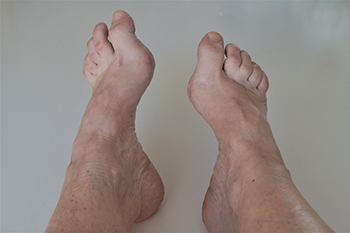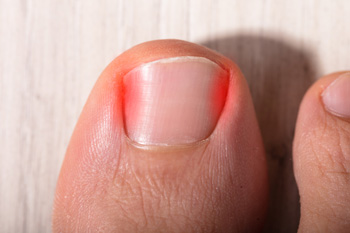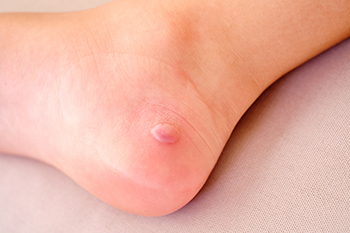
A high arch, also known as pes cavus, occurs when the arch of the foot is excessively elevated. This condition may be inherited or linked to neurological disorders such as Charcot-Marie-Tooth disease, cerebral palsy, or spinal cord abnormalities. Symptoms include foot pain, instability, difficulty fitting into shoes, and excessive pressure on the ball and heel of the foot. High arches can lead to calluses, hammertoes, ankle instability, and an increased risk of stress fractures. Some individuals experience difficulty walking or standing for long periods due to inadequate shock absorption. In severe cases, medical intervention may be necessary to improve comfort. If you have high arches that are causing pain or discomfort, it is suggested that you contact a podiatrist who can help you to manage this condition, possibly by offering custom-made orthotics.
Foot Pain
Foot pain can be extremely painful and debilitating. If you have a foot pain, consult with Jordan S. Steinberg, DPM from Florham Park Podiatry . Our doctor will assess your condition and provide you with quality foot and ankle treatment.
Causes
Foot pain is a very broad condition that could be caused by one or more ailments. The most common include:
- Bunions
- Hammertoes
- Plantar Fasciitis
- Bone Spurs
- Corns
- Tarsal Tunnel Syndrome
- Ingrown Toenails
- Arthritis (such as Gout, Rheumatoid, and Osteoarthritis)
- Flat Feet
- Injury (from stress fractures, broken toe, foot, ankle, Achilles tendon ruptures, and sprains)
- And more
Diagnosis
To figure out the cause of foot pain, podiatrists utilize several different methods. This can range from simple visual inspections and sensation tests to X-rays and MRI scans. Prior medical history, family medical history, and any recent physical traumatic events will all be taken into consideration for a proper diagnosis.
Treatment
Treatment depends upon the cause of the foot pain. Whether it is resting, staying off the foot, or having surgery; podiatrists have a number of treatment options available for foot pain.
If you have any questions, please feel free to contact our office located in Florham Park, NJ . We offer the newest diagnostic and treatment technologies for all your foot care needs.

Ingrown toenails occur when the edge of a toenail grows into the surrounding skin, causing pain, redness, and swelling. The affected toe may become tender to the touch and appear inflamed. If left untreated, the area can become infected, and pus or drainage may develop. Most commonly, ingrown toenails affect the big toe, but they can occur on any toe. This condition is often caused by improper nail trimming, wearing ight footwear, or trauma to the toe. People with curved nails, or conditions like diabetes or poor circulation, are more prone to developing ingrown toenails. The pain can range from mild discomfort to severe, making walking or wearing shoes difficult. A podiatrist can help by carefully removing the ingrown portion of the nail, providing antibiotics if an infection is present, and offering advice on proper nail care and footwear. If you have a painful ingrown toenail, it is suggested that you schedule an appointment with a podiatrist.
Ingrown toenails can become painful if they are not treated properly. For more information about ingrown toenails, contact Jordan S. Steinberg, DPM of Florham Park Podiatry . Our doctor can provide the care you need to keep you pain-free and on your feet.
Ingrown Toenails
Ingrown toenails occur when a toenail grows sideways into the bed of the nail, causing pain, swelling, and possibly infection.
Causes
- Bacterial infections
- Improper nail cutting such as cutting it too short or not straight across
- Trauma to the toe, such as stubbing, which causes the nail to grow back irregularly
- Ill-fitting shoes that bunch the toes too close together
- Genetic predisposition
Prevention
Because ingrown toenails are not something found outside of shoe-wearing cultures, going barefoot as often as possible will decrease the likeliness of developing ingrown toenails. Wearing proper fitting shoes and using proper cutting techniques will also help decrease your risk of developing ingrown toenails.
Treatment
Ingrown toenails are a very treatable foot condition. In minor cases, soaking the affected area in salt or antibacterial soaps will not only help with the ingrown nail itself, but also help prevent any infections from occurring. In more severe cases, surgery is an option. In either case, speaking to your podiatrist about this condition will help you get a better understanding of specific treatment options that are right for you.
If you have any questions please feel free to contact our office located in Florham Park, NJ . We offer the newest diagnostic and treatment technologies for all your foot and ankle needs.

A foot blister is a small, fluid-filled sac that forms on the skin due to irritation or damage. It is often caused by friction, which occurs when shoes or socks repeatedly rub against the skin. Heat and moisture can also contribute to blister formation, especially in warm environments where excessive sweating softens the skin. Allergic reactions to certain materials in footwear or socks may trigger blisters as well. Some medical conditions, such as diabetes, eczema, or infections, can make individuals more prone to developing blisters. Symptoms include redness, swelling, tenderness, and a sensation of warmth surrounding the affected area. Blisters can become infected and may cause difficulty in completing daily activities. If you have a blister anywhere on your foot, it is suggested that you contact a podiatrist who offers safe and sterile treatment before it becomes infected.
Blisters may appear as a single bubble or in a cluster. They can cause a lot of pain and may be filled with pus, blood, or watery serum. If your feet are hurting, contact Jordan S. Steinberg, DPM of Florham Park Podiatry . Our doctor can provide the care you need to keep you pain-free and on your feet.
Foot Blisters
Foot blisters are often the result of friction. This happens due to the constant rubbing from shoes, which can lead to pain.
What Are Foot Blisters?
A foot blister is a small fluid-filled pocket that forms on the upper-most layer of the skin. Blisters are filled with clear fluid and can lead to blood drainage or pus if the area becomes infected.
Symptoms
(Blister symptoms may vary depending on what is causing them)
- Bubble of skin filled with fluid
- Redness
- Moderate to severe pain
- Itching
Prevention & Treatment
In order to prevent blisters, you should be sure to wear comfortable shoes with socks that cushion your feet and absorb sweat. Breaking a blister open may increase your chances of developing an infection. However, if your blister breaks, you should wash the area with soap and water immediately and then apply a bandage to the affected area. If your blisters cause severe pain it is important that you call your podiatrist right away.
If you have any questions, please feel free to contact our office located in Florham Park, NJ . We offer the newest diagnostic and treatment technologies for all your foot care needs.

